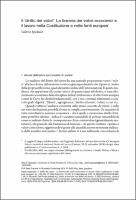Chapter Il ‘diritto dei valori’. La tirannia dei valori economici e il lavoro nella Costituzione e nelle fonti europee
Abstract
After analysing the different meanings of the term «value» and the passage from juridical positivism to «the right of values» (described in its essential characteristics), the essay points out the constitutional principles of labour in the Italian Constitution and in the European legal sources. The evolution of the legislation enacted in the last few years (mainly since the last decade of the twentieth century) shows that Labour Law has been functionalized to reaching economic targets, creating a «tyranny of values», according to Carl Schmitt’s theory. However, the supremacy of economic values which has influenced the legislation is in contrast with the principles of Labour protection established in the Constitution, in the European legal sources and in the Charts of fundamental rights. Such principles, in the light of the rules of interpretation of these legal texts, impose different legal disciplines. They are also based on the interpretations of the Constitutional Court which define labour as a fundamental right of man and require a «personalistic» rather than a «mercantile» vision of Labour Law protection. Also the European legal sources protect labour to a similar extent to the Italian Constitution, with specific reference to the European Social Chart. However if, as expressed by some decisions of the Court of Justice, we should sustain that the law of the European Union does not express the same «idea of work» as our Constitution, this situation would not justify the prevalence of the economic dimension of labour. In fact, the Italian Constitutional Court has recently stated that the principles established by the European legislation must be «harmonized and balanced» with those contained in the Constitution, in order to ensure «the highest protection of rights at a systemic level» (judgement no. 269/2017). Such harmonization does not allow economic values to prevail over some es- sential labour characteristics (such as dignity, freedom of expression, safety, equal conditions of labour and remuneration, etc.) with which the human personality is formed.


 Download
Download Web Shop
Web Shop